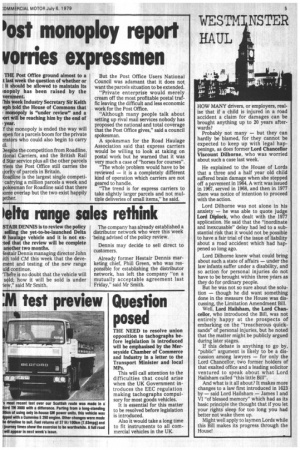WES TM NSTER HAUL
Page 7

If you've noticed an error in this article please click here to report it so we can fix it.
HOW MANY drivers, or employers, realise that if a child is injured in a road accident a claim for damages can be brought anything up to 20 years afterwards?
Probably not many — but they can hardly be blamed, for they cannot be expected to keep up with legal happenings, as does former Lord Chancellor Viscount Dilhorne, who was worried about such a case last week.
He explained to the House of Lords that a three and a half year old child suffered brain damage when she stepped off a pavement in 1964. A writ was issued in 1967, served in 1968, and then in 1977 there was notice of intention to proceed with the action.
Lord Dilhorne was not alone in his anxiety — he was able to quote judge Lord Diplock, who dealt with the 1977 application. He said that the "inordinate and inexcusable" delay had led to a substantial risk that it would not be possible to have a fair trial of the issue of liability about a road accident which had happened so long ago.
Lord Dilhorne knew what could bring about such a state of affairs — under the law infants suffer under a disability, and so action for personal injuries do not have to be brought within three years as they do for ordinary people. But he was not so sure about the solution — though he did want something done in the measure the House was discussing, the Limitation Amendment Bill.
Well, Lord Hailsham, the Lord Chancellor, who introduced the Bill, was not entirely happy at the prospects of embarking on the "treacherous quicksands" of personal injuries, but he noted that the matter might be publicly argued during later stages.
If this debate is anything to go by, "public" argument is likely to be a dis cussion among lawyers — for only the Lord Chancellor, two former holders of that exalted office and a leading solicitor ventured to speak about what Lord Hailsham called "this little Bill".
And what is it all about? It makes more changes to a law first introduced in 1623 by — said Lord Hailsham — James 1 and VI "of blessed memory" which had as its basic principle the thought that if you let your rights sleep for too long you had better not wake them up.
Might well apply to laymen Lords while this Bill makes its progress through the House!




























































































































